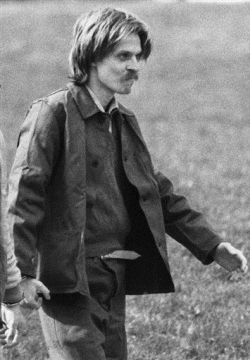|
 Former German terrorist released after 26 years Former German terrorist released after 26 years
 Send a link to a friend
Send a link to a friend
[December 20, 2008]
BERLIN (AP) --
Throughout the 1970s, the Red Army Faction was the scourge of capitalist West Germany and Christian Klar one of its most notorious leaders
- the force behind a murder spree that included the slayings of a federal prosecutor, an industrialist and the chief of a major bank.
On Friday, Klar walked free from prison after 26 years - angering family and friends of victims and many Germans who recalled the fear of living through the Marxist-Leninist group's terror campaign, which killed 34 people and injured hundreds before the group formally disbanded in 1998.
|
|
 Opponents of Klar's release argue he has never expressed regret for his crimes, nor explicitly distanced himself from the Red Army Faction mantra that it was justified in its brutal response to what it viewed as capitalist oppression of workers and U.S. imperialism in West Germany. Opponents of Klar's release argue he has never expressed regret for his crimes, nor explicitly distanced himself from the Red Army Faction mantra that it was justified in its brutal response to what it viewed as capitalist oppression of workers and U.S. imperialism in West Germany.
"That a hardened criminal who was handed six life sentences could be released under such circumstances may be legally justifiable, but remains very difficult to accept," said Stephan Mayer, a lawmaker for the conservative Christian Democratic Union.
German law is based on the principle of rehabilitation and it is very common for convicted murderers to serve less than 20 years for life sentences. Several other former members of the Red Army Faction have also been released.
Only one former member of the group, Birgit Hogefeld, remains in prison. She will be eligible for parole in 2011.
Yet as a ringleader of the group's second generation, which carried out the "German Autumn," an especially bloody period of leftist violence in late 1977, Klar is perhaps Germany's most prominent former left-wing terrorist to walk free.

As the decades have passed, the Red Army Faction has become the stuff of pop culture, giving rise to a string of television dramas and feature films, many of which have faced criticism for glamorizing the era and portraying the young killers as Robin Hood-type characters.
Several of the group's symbols, such as its trademark machine gun and red star, have found their way into fashion items, from T-shirts to infant's bodysuits marked "Terrorist."
The latest movie, "The Baader Meinhof Complex," directed by Uli Edel, came out in September and has been chosen as Germany's contender for a foreign-language Oscar nomination
- despite criticism from families of the gang members that it misrepresents the group and is too violent.
In its early years RAF was often referred to as the Baader-Meinhof gang, after leading members Andreas Baader
- who killed himself in prison after failed efforts to secure his release through extortion
- and Ulrike Meinhof, who also committed suicide in prison.
Under Klar, the so-called second generation of the group went on to bomb U.S. military targets and assassinate a string of business and political figures.
Among the murders for which Klar was convicted were those of chief West German federal prosecutor Siegfried Buback, industrial association head Hanns-Martin Schleyer, and Dresdner Bank chief Juergen Ponto
- all carried out in 1977.
[to top of second column] |
 Buback's son has repeatedly urged Klar to explain who pulled the trigger on his father when he and his two drivers were gunned down on April 7, 1977. Yet despite a fierce public debate and a review of the case, ordered by the nation's top security official, Klar has remained silent.
Asked Friday if he would be willing to speak with Klar, Buback said that while he wouldn't seek him out, he wouldn't hang up if he called.
"If Christian Klar would call me to tell me about what he or others did, of course I would speak with him," Buback told Focus weekly. "After all, we are still searching for the truth."
Klar's lawyer, Heinz-Juergen Schneider, expressed doubt his client would seek to make any statements to the public, insisting Klar was seeking to start a normal life.
Klar has been in prison since his arrested on Nov. 16, 1982. Ten years later, he was sentenced to six concurrent life sentences, as well as individual 15-year, 14-year and 12-year sentences.
According to Schneider, Klar plans to move to Berlin, where he was taking up an offer of apprenticeship at one of the nation's leading theaters, the Berliner Ensemble
- founded by legendary leftwing playwright Berthold Brecht - as a stage technician.
The theater's director, Claus Peymann said at the time he felt Klar deserved a chance to try to reintegrate into society after so many years in prison.
[Associated
Press; By MELISSA EDDY]
Copyright 2008 The Associated
Press. All rights reserved. This material may not be published,
broadcast, rewritten or redistributed.

 |